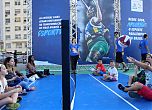
The return of Dia do Rua reflects the continuing desire to bring a musical parade of a different kind to the streets of Rio, a city not exactly unfamiliar with the premise of outdoor partying. More than that, though, organisers Qinho and Thiago Vedova want the occasion to be an opportunity for the public at large to be exposed to the latest crop of fresh, independent carioca bands and vise-versa, using the best open-to-all venue at the city’s disposal, the beachfront roads of Ipanema and Leblon.
Bright young things like Bondesom, Mohandas and Letuce were involved back in 2011 and have gone on to forge strong positions in the city’s alternative scene. The band names this time round may not mean too much to you know, then, but that doesn’t mean you aren’t likely to hear the hottest new thing as the sun sets behind the Dois Irmãos, as Qinho and Vedova revealed to Time Out.
The Occupy the Streets concept is a fairly common approach in many parts of the world but what made you want to hold the first Dia da Rua in 2008?
Qinho: It was a combination of a guerrilla spirit and a certain romanticism that emerged here at the same time. We wanted the streets to be filled with artistic endeavour, and thought we would give it a shot. The first edition made it clear we were on the right track, with bands playing at the same height as their audience and no need for a stage of any kind.
What made you want to keep repeating the project?
Vedova: There’s nothing better than shortening the distance between audience and performer, and at the same time there were few helping hands to the new music scene in Rio, a role we wanted to try and fill. There are amazing artists who have their fans and have played gigs and festivals, but are little-known to the masses, the thousands of people who frequent the beach every weekend for example. This isn’t just another festival, it has its own energy and identity.
With ten bands playing almost simultaneously, does it work okay from a logistical point of view?
Vedova: The Dia da Rua is a musical parade, a true Flash Mob. Unpredictable issues are all a part of that, and it is impossible to follow the script, but there’s always a happy ending.
Does the loose vibe of the festival and the audience positively affect that organisation?
Qinho – It definitely has something to do with it. To start with, these are free concerts, which changes the relationship with the crowd, particularly in Rio where they are not always so receptive to new artists. Plus, the simultaneous nature of the gigs brings a sense of a musical invasion, which is always welcome here. It is a place for musical discovery.
Describe the selection process of the bands
Vedova: The festival provides a snapshot of the current scene, even though there are differing levels of experience in there too, some very fresh, some that have been around for longer. The key is to show innovative, independent artists, not ones that are already blowing up. We allow them to play a show without worrying about the ticket sales or costs – everyone is on the guestlist and nobody is paying.
How did the recent closure of cultural venues by the fire department affect the creative scene here?
Vedova: It was terrible. The main venues in the city for these kinds of bands were closed. It is hard to find venues to play in, I know first-hand the despair some of the artists have in trying to find somewhere.
The line up is a little more electronic this year, can you talk us through it?
Vedova: Most of the bands that played the first edition played at the second, and some again at the third, by which time the event was rather more structured. But we want to avoid repetition of the line ups, and this year we wanted to mix things up more. We have a huge funk orchestra in the form of Abayomy, we have Rodrigo Cascardo who is very fresh on the scene, more electronic sounds with Mahmundi and Wladimir Gasper, the mash up sound of João Brasil, the swing of Dai Moraes… there’s something for everyone.



